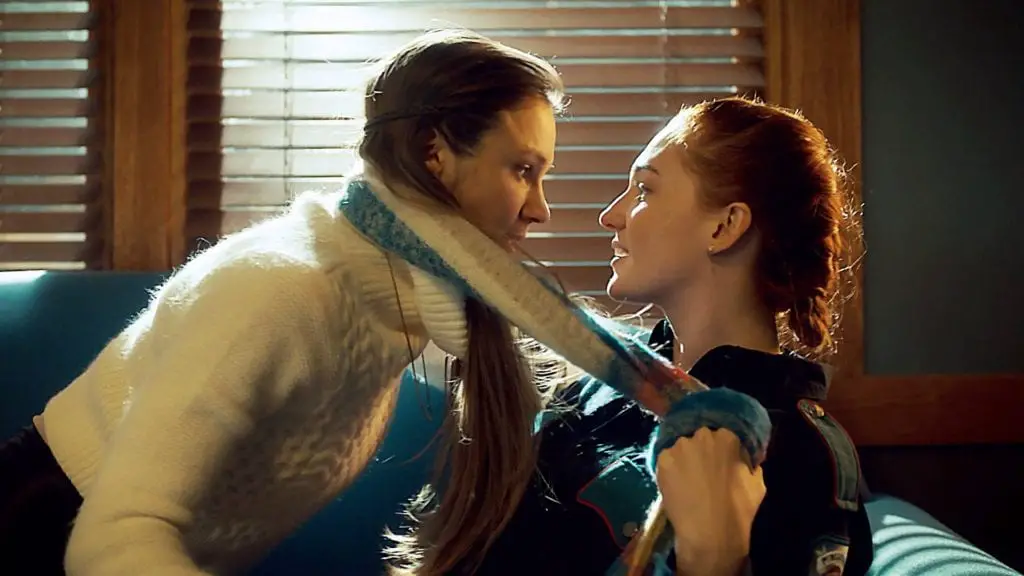Wynonna Earp at first glance is a story about killing monsters and putting demons in the earth. Most of the early episodes have a ‘monster of the week feel to them’ that carries over even into some of the later episodes. But the real emotional drama is less about the demons attacking the Earp family than about each of the sister’s relationship to the past. The demons are real, but they’re also metaphorical. This is the story of a family—one could even say a town—defined by it’s relationship to the past, a family drama neatly wrapped up in a western, supernatural/horror fantasy’s clothing.
The premise of the show is that Wyatt Earp (yes the Wyatt Earp of wild west fame) and his descendants were cursed. He killed 77 men in his time as a lawman, and every generation these 77 men and women come back from hell as Revenants to plague his descendants. The Revenants are gifted with varying degrees of demonic powers and the only thing that can kill them and send them back to hell is Peacemaker, Wyatt Earp’s gun, in the hands of the oldest Earp child. The Earp heir, as he or she is called, comes of age at 27. The Revenants will try to kill the Earp heir and the heir must put them down, only to have them respawn once the heir dies. It’s an endless cycle of horror that no one (as yet) has been able to break.
The Earp Sisters
When we meet Wynonna she is actively running from her past, or at least has been for the past several years of her life. Due to an incident when she was a child where she accidentally killed her father instead of the Revenants trying to kill him, she’s had a, shall we say, troubled existence. The oldest Earp sister Willa was kidnapped and presumed dead during this same attack, leaving Wynonna and Waverly to grow up with only each other and their uncle and aunt.

Wynonna has grown up in a town that is suspicious of her, the citizens unable or unwilling to understand that her attitude and rebellious behavior is a reaction to trauma. She’s the black sheep of the town, defiant of authority, drinks freely, and is sexually liberated. She the kind of rebel small towns hate. Once she was old enough, she skipped town. In the first episode, her uncle has died under mysterious circumstances and Wynonna wants answers. But to return to Purgatory, she must face that she is the Earp heir whether she likes it or not. Thus when the season begins, she’s only now coming back home to face her past.
Wynonna: “You want me to break into the place I work? Yeah, okay. I’m surprised it took me this long.” (1.o5, “Diggin’ up Bones”)
Waverly Earp, Wynonna’s younger sister, has been living in her past. She’s never been able to get away from her home town or the life that she has there. She still has her same high school boyfriend and works in the town bar. She’s good friends with the townsfolk and live in town above Shorty’s bar. She’s established roots in Purgatory. Unlike Wynonna, she has wanted to take up the mantle of Earp heir most of her life. As she is too young, she channels that passion into finding a way to break the Earp curse. She’s absorbed in the past hundred years or so of Earp family history and knows many of the Revenants by name. She wants to be the Earp heir as much (if not more) than Wynonna wants to not be the heir. She’s not running from her past, she’s wallowing in it.
By the end of the season, we learn that Willa is alive and being held by a Revenant and his cult-like commune of women. On the night Wynonna killed their father, Bobo Del Ray (the head Revenant) kidnapped her. For years he held her hostage and groomed her so that he could use her to escape Purgatory (I know, such a fitting name for this town). As an act of malice, the Stone Witch freed Willa from Bobo Del Rey, and Willa wandered into the commune.
Thus, Willa is the perfect example of someone completely cut off from her past. She has no memory, no life apart from who she is at the commune. Once she remembers her past, she inordinately attaches herself to it, making who she used to be her current identity. Her identity as the Earp heir consumes her until Bobo rekindles her memories of him. Their relationship becomes her new identity. She uses this part of her past as an excuse to turn on her family and try to save the exploitative, abusive man who groomed her to save his own skin. (Even if Bobo loved her—in whatever twisted way it is possible for a demonic human Revenant to love a human being—his goal was to use her, not live happily ever after. He had already used Waverly to get him past the magical wards that protect the Earp homestead, after all.)
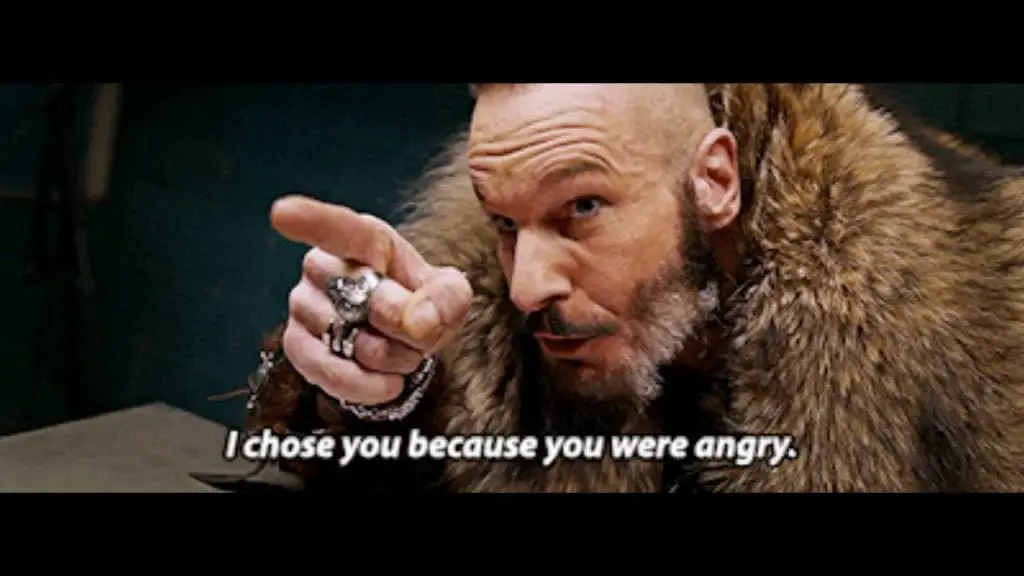
The exploration of past and present leeches into the secondary characters as well. The Revenants themselves are living shells of their former lives. Their death at the hands of Wyatt compels them toward getting revenge on his descendants. They are ghosts of their former lives haunting Purgatory and the Wyatt family in particular. The father has eaten sour grapes and his children’s teeth have been set on edge.
Then you have Doc Holliday. This immortal, but not demonic, man is tormented by his past, specifically by his relationship with Wyatt Earp. Like the Revenants, he is consumed with his history. Unlike them, he is attempting, albeit sporadically and inconsistently, to move on. He tries to run away, but his relationship with the current Earp (Wynonna) draws him back.
On the other, there’s Agent Xavier Dolls, a special agent with the FBI who has no real past that we can speak of. We know Dolls as a being who exists primarily in the present, though his shadowy past with the FBI Black Badge Division (and supernatural drug addiction) is hinted at. It is precisely the mystery of his past that marks him in relationship to the other main characters. His past has layers of darkness to it, but he never speaks of it.
One could even argue that the entire town is plagued by the Earp family past. Were it not for Wyatt and the curse, they would not have Revenants trying to kill them and FBI agents coming into town trying to hunt demons. As innocent as the townsfolk are, they are caught up in this family’s curse as much as the sisters are, though in a less existential way.
The Earp Family Drama
Each of the Earp sisters is attempting to reconcile their individual and their family’s past to their current reality. Wynonna’s moment of realization is when she meets Fish and Levi (1.05, “Diggin’ up Bones”), two gay Revenants whose only crime was loving each other. Their desire to be together, whether in life or in hell, leads her to perceive that killing them could be considered a form of mercy killing. Before she shoots them with Peacemaker, she tells them to “make their peace.” This catchphrase represents her self conceptualization of her own work: a kind of last rites for demons condemned to hell.
It also marks a shift for her internal conflict. Rather than running, she is beginning to embrace who she is. Every time she tells a Revenant, “make your peace,” she’s reminding herself that her goal is to not just to make peace with the Earp family past. She is making peace with the town, her feelings of being ostracized, left out, and unwanted. The past where she killed her father and her sister was kidnapped and presumed murdered. The past where she was responsible for all of that and failed her younger sister to boot. From this episode onward, we see the seeds of Wynonna’s personal growth. She’s not perfect at it or consistent, but she’s trying. She is reconciling with and accepting her past in order to move on into her present reality.
Her attraction to both Doc and Dolls highlights her struggle for equilibrium. Doc signifies her family’s past and Dolls her attempts to take up the role of Earp heir. Doc accepts her at face value, but he began the series as a traitor to the Earp family. His loyalty is questionable and his obsession with the past makes him emotionally unstable. He’s even more lost than Wynonna in many ways. At the same time, Dolls also has a past he is actively hiding from everyone in Purgatory, including Wynonna. This secretiveness means that he cannot ground Wynonna in the way that Officer Haught (see below) does Waverly.
Waverly, on the other hand, is attempting to grow out of her past and learn more about who she is as a person right now. Her ‘aha’ moment is when she dumps Champ (though it could be argued that it was when she meets Officer Nicole Haught as her interactions with Officer Haught help facilitate her dissatisfaction with Champ). After her aunt sells the bar to Bobo Del Ray, she confronts Waverly, telling her to go for who and what she wants.
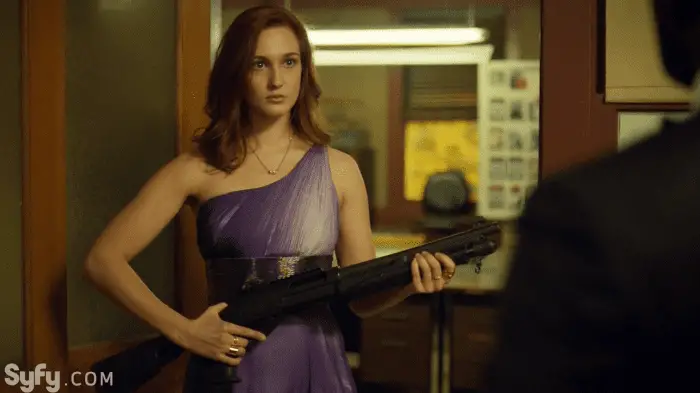
This not-so-subtle nudge from her aunt prompts Waverly’s realization that she doesn’t want Champ or the life he represents, the life her past self wanted. She wants Nicole. She’s not merely the nerdy younger sister who devoted her life to studying the Earp family history. She is also an independent, intelligent woman who is in love with the tall, redheaded drink of water that is Officer Dimples. Ahem, I mean Officer Haught. It doesn’t matter what the rest of the town thinks if she loves a woman. She’s going to go for what she wants regardless of what her past tells her she ought to want or do.
Interestingly enough, Nicole Haught seems to be the only character that is well-grounded in this regard. We don’t know much about her past either, but unlike with Dolls, it seems to be more straightforward (pardon my pun) than sinister. She’s also very much content with who she is as a person now. We get hints that it wasn’t always this way when she first interacts with Waverly.
Waverly: “I’m in a relationship with a boy, man.”
Nicole Haught: “A boy-man. Yep, I’ve been there. It’s the worst.” (1.02, “Keep the Home Fires Burning”)
She’s had her moments of growing pains, but they’re not red-flag worthy. She’s a normal woman who had a normal past and now is living life as she wants it to be.
In that sense, she provides a sense of grounding to the hectic nature of the rest of the characters. She’s also one of the reasons why Waverly is coming into her own by the end of the season as well (demonic possession by the blood of an evil kraken monster in the finale notwithstanding). This includes Waverly distancing herself from her family, especially as her relationship with Nicole happens at the same time as Willa returning from the cult.
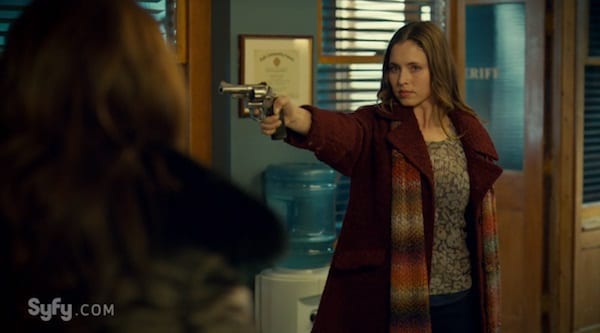
Willa returning highlights the conflicting relationship the other sisters have with their past. For Waverly, Willa represents the worst time in her life, the time when she was the neglected, teased, picked on younger sister overlooked or ignored by almost the whole family. There’s a reason why Waverly was the one with the imaginary friend is what I’m saying (even if said imaginary friend was actually a Revenant bent on killing her family). As much as she loves her sister, there’s an undercurrent of resentment and fear in Waverly’s response to Willa’s presence.
For Wynonna, Willa represents a time when she was happy, healthy, and whole. Willa represents the Earp family together. A time when Wynonna wasn’t her father’s murderer and her sister wasn’t kidnapped and presumed ead because she didn’t have the power to stop it. Willa is nostalgia: a happy, healthy family (though not so healthy and happy as it seemed, we learn) and a time when Wynonna felt integrated as a person.
Willa herself, as I said earlier, is a disintegrated person when she’s recovered from the commune. She has no past; she’s instead a mirror for the other two sisters to work out their issues with respect to their relationships with each other and their pasts. Once she remembers who she is, the fractures deepen. She antagonizes both of her sisters in different ways, challenging their attempts at equilibrium.
Willa’s attempts to rediscover her memories drag both sisters back into the past while simultaneously sticking her fingers in their most sensitive new discoveries about the present. Wynonna’s nostalgia for a happy family and relief at discovering her sister alive run into Willa’s more bitter recollections of their family dynamic. Undeterred, Wynonna continues to revel in the now rose-colored reminiscences of her life before their father’s death and the lure of a happy family threatens to undo Wynonna’s ties to her present. It is only when she recalls that it is Willa, not her, that was trained to be the Earp heir that Wynonna understands just how much that present truth means to her self-conception. What was once a reluctant duty has become something she wants and finds meaningful.
Willa has the opposite effect on Waverly. Unaware of how new Waverly is to being in a relationship with a woman, Willa pointing out that Waverly hasn’t told Wynonna about her and Nicole shames Waverly. It touches the sensitive core of Waverly that fears her family doesn’t love her or will ignore her again. She’s only just rekindled her relationship with Wynonna, and Willa’s presence is a threat to the bonds she’s formed. Waverly fights back by confronting her about her cruel behavior as a child. Willa seems about to point out that their father was abusive when Waverly bites back that he was at least attentive to Willa. He remembered Willa’s birthday, but presumably not Waverly’s.
The interaction hints that all was not as rosy as Wynonna remembers. It’s the kind of interaction that seems to be building to Waverly cutting ties with her past, as Wynonna had done. Ironically enough, it is the past (in the form of the Earp family curse) that drives home the thought that she still loves her family, even if they’ve hurt her. Willa’s betrayal and ultimate demise forms a kind of inclusio for the series, each sister’s fraught relationship to their personal family history and present reality being condemned to die along with the long-lost sister whose disappearance had shaped them for much of the lives.
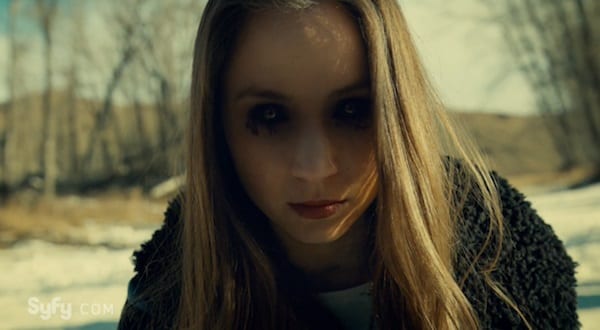
The Earp Demons
For each of the sisters, then, the demons look different, aside from the literal ones that is. For Wynonna, her demons stem from her actions a child—the accidental death of her father, the kidnapping and supposed murder of her sister, the way she coped with trauma through rebellion and the way her social sphere rejected her for doing so. She is not entirely responsible for these events, for sure, but they’ve impacted her present and threaten to consume her future. If she cannot forgive her town for rejecting her or embrace her position as the Earp heir, much more than her psychological balance could be lost.
For Waverly, the demons flow from social expectation and her self conceptualization vis-à-vis her family. It’s about her relationship with her sisters and the relationship between who she is expected to be and who she really is. The self-imposed mantle of being the Earp heir that Willa initially can’t take up and Wynonna doesn’t want is her identity when the season opens. By the end of the season, she has found a way to move on from what the town expects of her. Bobo’s statement that she isn’t, in fact, an Earp, whatever that might mean, could mean the end of her other demon, though it will cause some damage before it is buried. I do think that she will be instrumental in figuring out how to break the curse, though. She’s not a nerd for nothing.
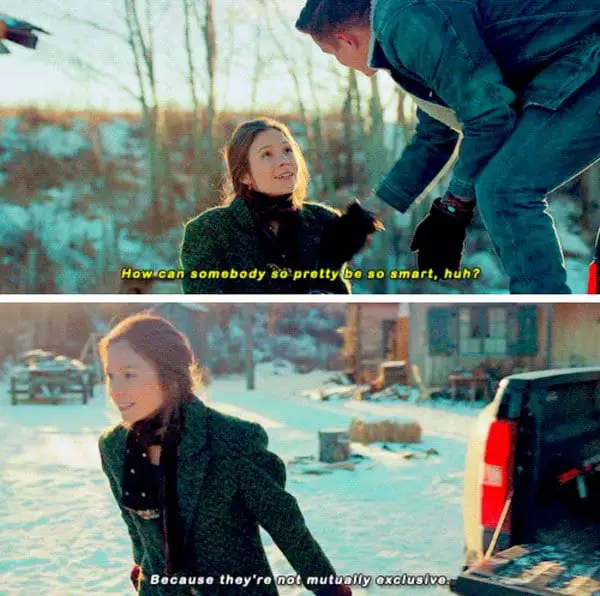
Each of these personal struggles situate the sisters not only in relation to each other, but in relation to the town. Wynonna struggles to free herself from the town’s perception of her as a ‘bad girl’ and a rebel—someone not worth forgiving (see, 1.04, “The Blade”). Waverly must face being shunned or rejected for being who she is once she starts a relationship with Officer Haught. Thankfully, the town turns out to be open-minded about Waverly being a woman loving woman. Unfortunately, the last two episodes this season have shown us that Wynonna is still not entirely forgiven for her past behavior, even if she’s come to a better place about it for herself.
The undercurrent to this show about killing demons, then, is that not all demons are Revenants from hell who want revenge on your family because your great-grandfather killed them. The most important demons to put to rest are the ones that live inside your own head and heart. Waverly might very well find a way to break the curse, but its’ just as important that she find a way to break free from her past. Wynonna could kill every single Revenant and yet the most dangerous enemy lives in herself and in how she relates to her family and town. Willa’s demons surface once she remembers her past and chooses to build her identity around it rather than make a new path.
Willa threatens to ‘steal’ the birthright that Waverly has always wanted and Wynonna has only come to accept is her responsibility (one she finds can be a meaningful way to peace). Instead, she rejects her family, choosing instead the warped and twisted past with Bobo Del Ray. She’s both a tragedy and a cautionary tale for her sisters. Both Waverly and Wynonna are attempting to avoid just this pitfall. Wynonna must accept her broken past in order to move on. Waverly must shed the layers of expectation her past has heaped upon her. The danger for both of them is the same as Willa’s: cling to and identify with the past to the point that it destroys you.
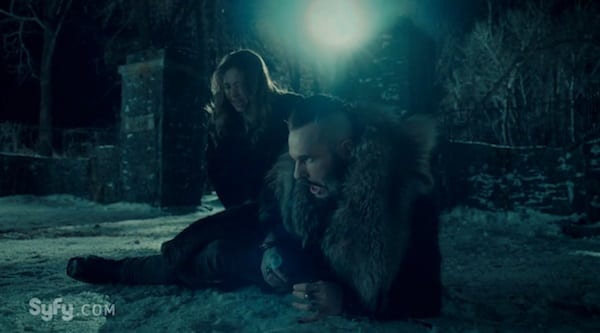
Conclusion
This is a family plagued by demons in more ways than one. One of the messages I take from the show is how you bury your demons matters just as much as that you do. Are you doing it mindlessly because it is part of your duty, to avenge your family, or to sate a bloodlust? Or, are you doing it to make peace? Is the goal mindless repetitive violence or wholeness, a life, a future, an integrated self, and healed relationships? The show is beginning to make it clear that there is a difference and whatever you choose marks you.
This is a story of inter-generational trauma. Each child must take up the mantle to again take out the demons that are haunting the family, but it seems a hopeless cause. The demons keep coming back. Wynonna tries to run away from a heritage that was never intended to pass to her while Waverly is trying to claim it. Each one fails and must address the situation in a new way in order to move forward. Wynonna must embrace the mantle, even face willingly giving up what she had now claimed. Waverly must let it go and accept that it is not her fight, at least not in the way she originally wanted.
Wynonna’s arc is thus trying to integrate her past into her present, recognizing that her past is a part of who she is whether she wants it to be or not. Waverly’s is an attempt to disengage from her past and prevent it from consuming her the way it has for the last several years. Waverly says, “I am not my past” and Wynonna says, “My past is a part of me.” They can each only help their family face it’s past when they accept their own pasts and move on. Perhaps in the upcoming season, we will see them finally make their peace with the curse. If not, I look forward to more one liners from Wynonna.
Wynonna: “I have something better.”
Doc: “What’s better than dynamite?”
Wynonna: “Boobs.” (1.05 “Diggin’ up Bones)
And WayHaught. In a year plagued with dead LGBT characters, WayHaught is everything.
